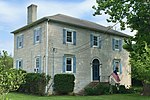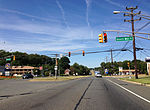Bordentown School
1886 establishments in New Jersey1955 disestablishments in New JerseyAfrican-American history of New JerseyBordentown, New JerseyDefunct schools in New Jersey ... and 6 more
Educational institutions disestablished in 1955Educational institutions established in 1886Historically segregated African-American schools in the United StatesNational Register of Historic Places in Burlington County, New JerseyPublic high schools in Burlington County, New JerseyVocational schools in New Jersey

The Bordentown School (officially titled the Manual Training and Industrial School for Colored Youth, the State of New Jersey Manual Training School and Manual Training and Industrial School for Youth, though other names were used over the years) was a residential high school for African-American students, located in Bordentown in Burlington County, New Jersey, United States. Operated for most of the time as a publicly financed co-ed boarding school for African-American children, it was known as the "Tuskegee of the North" for its adoption of many of the educational practices first developed at the Tuskegee Institute in Alabama. The school closed down in 1955.
Excerpt from the Wikipedia article Bordentown School (License: CC BY-SA 3.0, Authors, Images).Bordentown School
Geographical coordinates (GPS) Address Nearby Places Show on map
Geographical coordinates (GPS)
| Latitude | Longitude |
|---|---|
| N 40.141388888889 ° | E -74.723611111111 ° |
Address
08505
New Jersey, United States
Open on Google Maps





